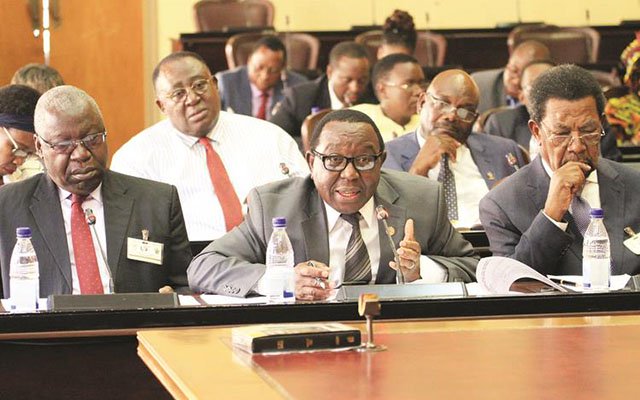GOVERNMENT yesterday ordered fuel price cuts with immediate effect a day after the Ministry of Finance and Economic Planning reduced excise duty on diesel, petrol and paraffin, as Government kickstarts the process of internal devaluation.
The move is meant to stabilise prices of basic commodities as this would lower the costs of doing business.
Energy and Power Development Minister Ambassador Simon Khaya Moyo directed dealers to effect a 3,6 percent reduction on the maximum retail petrol price to $1,35 per litre, 5,4 percent cut on the retail price of diesel to a price limit of $1,23 per litre and a 5,6 percent cut on paraffin price to a cap of $1,17 per litre.
Prior to the downward review of duties, petrol was selling at an average price of $1,40 per litre while the prices of diesel and paraffin were about $1,30 and $1,24 per litre, respectively.
"After necessary consultations and in terms of section 225 of customs and Excise Act Chapter 23:02, the Minister of Finance and Economic Planning has reduced excise duty on fuel with effect from January 23 2018.
"The excise duty on petrol has been reduced from 50 cents to 38,5 cents per litre while that from diesel and paraffin has been reduced from 40 cents to 33 cents per litre.
"This means that prices announced this week by the Zimbabwe Energy Regulatory Authority of $1,40 per litre of petrol, $1,30 of diesel and $1,24 per litre of paraffin will now come down to $1,35 per litre of petrol, $1,23 per litre of diesel and $1,17 per litre of paraffin with immediate effect," said Ambassador Moyo.
Industry and Commerce Minister Mike Bimha agreed to the assertion that the reduction in fuel prices marked the start of internal devaluation, but noted a lot needed to be done to address other cost drivers.
"Very much so because a lot of things that Government is already doing which will have an impact on the business environment," Minister Bimha said in a sideline interview with our Harare Bureau at the ongoing 48th edition of the World Economic Forum in Davos, Switzerland.
"The issue (entails) looking at efficiencies in terms of Government, looking at the whole reform on parastatals and which I am sure if we continue with the momentum and this pace will have positive impact on the overall business environment."
Zimbabwe has lately experienced wanton price increases, which have partly been blamed on high cost of doing business, including cost emanating from high prices of fuel and premiums charged on hard currencies on the black market. Acute shortage of foreign currency in the country has forced some businesses to resort to the parallel market buy the foreign currency they require to import basic commodities.
Minister Moyo said following the directive he issued yesterday, on the back of cuts in excise duty, he expected fuel dealers to comply.
"As Minister of Energy and Power Development I expect and trust that this important decision by the Government shall be implemented by all concerned parties and therefore expects nothing less than immediate compliance.
"This reduction of excise duty should benefit and stimulate the economy at large. I wish to point out that the reduction of fuel prices will not mean that this will remain fixed.
"Going forward the prices of fuel will either go up or go down in tandem with international oil price movements as has always been the case.
"As you are aware Opec and Russia have been implementing crude production cuts and this has resulted in continual firming of prices during mid-last year."
High fuel prices in the country have largely been blamed on layers of taxes and levies, despite a decline in world oil prices in the past few years.
Government has committed to implementing a raft of measures aimed at making Zimbabwe an attractive investment destination by reducing taxes and levies that have made the country uncompetitive.
- zimpapers
 Concern over Masvingo black market
Concern over Masvingo black market  Kenya declares three days of mourning for Mugabe
Kenya declares three days of mourning for Mugabe  UK's Boris Johnson quits over Brexit stretegy
UK's Boris Johnson quits over Brexit stretegy  SecZim licences VFEX
SecZim licences VFEX  Zimbabwe abandons debt relief initiative
Zimbabwe abandons debt relief initiative  European Investment Bank warms up to Zimbabwe
European Investment Bank warms up to Zimbabwe  Young Investment Professional (YIP) Graduate Programme 2019
Young Investment Professional (YIP) Graduate Programme 2019 











 Young Investment Professional (YIP) Graduate Programme 2019
Young Investment Professional (YIP) Graduate Programme 2019
Editor's Pick